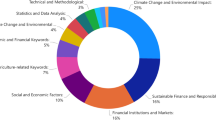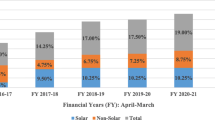Abstract
Technoscientific-legal rationality in policy-making is the statecraft of creating a ‘factual reality’ which in effect co-produces a combined technical and socio-political reality for people and institutions, and at the same time expresses the need for representation in politics. Concentrating on the deliberation proceedings and calculations of the Taiwanese Feed-In Tariff (FIT) Committee deciding on a ‘reasonable tariff’, this article explores the way that technoscientific knowledge-based deliberation, with tacitly enacted roles and boundaries, seriously constrains the possible forms and meanings of renewable energy (RE) and the notions of public interest emerging from the process. It argues the expert committee which is backed up by expert authority and manifests in a bureaucratic-managerial style is best portrayed as a mechanism of controversy settlement and depoliticisation, by distinguishing the ‘core technical issues’ from ‘the others’, and by calculating ‘relevant’ and ‘objective’ quantitative factors and values. The deliberation process reflects an incessant intention to purify the decision made by the committee and to eliminate the remaining discretion of the experts from wider visibility, which results in an overwhelming preference for mathematical technicality — the public’s ‘best interest’ is translated into the ‘reasonableness’ of the FIT, which is largely built on a designed formula for steering tariffs among the sea of uncertainty, by taking the average or median value of alternative FIT calculations. I argue this deliberation is democratically envisioned yet technocratically enacted, aiming to depoliticise the decisions made on tariff rates and thus preventing further controversy.


Similar content being viewed by others
Notes
The Feed-In Tariff (FIT) scheme, or renewable energy payment, is a government programme designed to promote the generation of renewable energy. The tariff rate is presented in the format of NTDs/kWh. FIT payments are made by Taipower, the state-owned electricity monopoly, for the electricity the contracted installation has generated.
The concept of meritocrats in East Asia may be quite different from the one in the English-speaking world. They are historically the class of ‘仕大夫’. They are often the intellectuals who passed the literary exam and got admission to the national Confucian academy, and also finally passed the higher civil service exam. This will gain them the aristocratic status as ‘scholar-officials’ (Downey and Han 2014) who work in the royal councils or offices. Nowadays, university professors taking a post of secondment to government ministries is still not uncommon.
In an authoritarian regime, they often have a double identity, both as an official member of the Nationalist party and a civil servant.
This is a private think-tank, founded in 1976, with which the MOEA tasks the mission of being the general secretariat of the deliberation.
Since 2014, the MOEA does not prescribe a rigid one-way communication in the sub-panel proceedings as before; it simply says ‘invite industry representatives for discussion’. However, at the same time, one expert member claims that ‘the session should not be open for industry representatives to attend, in order to maintain just discretion’ (2014.08.18.1400). There is no evidence that the proceedings were changed to allow more dialogue-style, two-way communication.
The stakeholders in sub-panels are the ‘representatives of industry’ while the participants in administrative hearing include a range of broader citizen participants, such as university students, NGO workers, community leaders and the staffs from private research institutes and MP’s offices.
As late as in December 2018, the administrative hearing still only provides a one-off session and when a controversy over FIT between off-shore wind farm industry and the MOEA broke out, the MOEA’s reaction still rigidly confines to the quantitative and objective values, requesting the industry to submit credible figures to the committee.
The meeting needs to be attended by more than the half of all members to be valid. The attendance is another tricky part, the governmental officials can use surrogates to attend the meeting while other members can’t. It can be used as an inadvertent method to deny one particular member’s participation.
Interviewee Q1 (engineering) and L2 (finance) are both university professors; the former is an expert member and the latter is a representative of a social group.
This exchange is indeed happening and has become routinised and formalised since late 2015 when a three-party bimonthly meeting (involving Taipower, industry and the MOEA) was scheduled regularly according to my informant.
It acts as a standard of cost-performance rate, the industry at least need to meet this minimum cost-performance rate to make profit.
However, he also told me that the industry always has the intention to argue the value to the 4th decimal point, which is ‘so important’ to the final tariff. The importance of the slight differences between values seems not to be based on the values themselves but on who argues for them.
Interviewee Q1: ‘there is no absolutely right or wrong here, they all just need to follow the general operation rules [derived from finance and economic expertise] in this sector’.
The decision is relevant to the outcome of the installation last year (compared to the policy target) as interviewee Q1 told me, the adjustment of the value is out of the ‘reasonableness’ or policy target.
References
Brown, Mark. 2009. Science in Democracy: Expertise, institutions, and representation. London: MIT Press.
Bureau of Energy. 2009. The minutes of the administrative hearing (2009.09.21.1500).
Bureau of Energy. 2010. The minutes of the administrative hearing (2010.12.14.1500).
Bureau of Energy. 2012. The minutes of the administrative hearing (2012.10.01.1330).
Bureau of Energy. 2014. The minutes of the administrative hearing (2014.10.09.0930).
Callon, Michel. 1986. Some Elements of Sociology of Translation: Domestication of the scallops and the fishermen of the Saint Brieuc Bay. In Power, Action, and Belief: A new sociology of knowledge?, ed. John Law, 196–223. London: Routledge & Kegan Paul.
Chang, Kuo-Hui. 2013. The Leviathan that nationalism longed for: The Chinese background of Taiwan’s technocracy. Journal of National Development Studies 12(2): 73–132.
Chou, Chien-Pang. 2009. The present status of the party caucus negotiation in Legislative Yuan (Feb. 1st, 2008–Jun. 16th, 2009). Taipei: National Taiwan University.
Cumings, Bruce. 1999. Parallax visions: Making sense of American-East Asian relations at the end of the century. Durham: Duke University Press.
Daston, Lorraine. 1992. Objectivity and the Escape from Perspective. Social Studies of Science 22(4): 597–618.
Downey, Gary Lee, and Kyonghee Han. 2014. Engineers for Korea. California: Morgan & Claypool Publishers.
Ezrahi, Yaron. 1990. The descent of Icarus: Science and the transformation of contemporary democracy. Cambridge: Harvard University Press.
Ezrahi, Yaron. 2004. Science and Political Imagination in Contemporary Democracies. In States of Knowledge: The co-production of science and the social order, ed. Sheila Jasanoff, 254–273. London: Routledge.
Ezrahi, Yaron. 2012. Imagined Democracies: Necessary political fictions. Cambridge: Cambridge University Press.
Flyvbjerg, Bent. 2001. Making Social Science Matter: Why social inquiry fails and how it can succeed again. Cambridge: Cambridge University Press.
Jasanoff, Sheila, and Sang-Hyun Kim. 2009. Containing the Atom: Sociotechnical Imaginaries and Nuclear Power in the United States and South Korea. Minerva 47(2): 119–146.
Legislative Yuan. 2009. Renewable Energy Development Act. In Article 9.
Ministry of Economic Affairs. 2009. The agenda of the fourth FITs deliberation meeting (2009.11.25).
Ministry of Economic Affairs. 2010. The appendix of the first FITs deliberation meeting (2010.09.24).
Ministry of Economic Affairs. 2011. The minutes of the third FITs deliberation meeting (2011.11.26).
Ministry of Economic Affairs. 2014. The appendix of the third FITs deliberation meeting (2014.10.31).
Ministry of Economic Affairs. 2015. The appendix of the third FITs deliberation meeting (2015.11.10).
Ministry of Economic Affairs, Bureau of Energy. 2010. MOEA holds FITs deliberation committee, and initials the process of deliberation for the FITs of 2011. http://www.moea.gov.tw/mns/populace/news/News.aspx?kind=1&menu_id=40&news_id=19753. Accessed 21 Aug 2016.
Porter, Theodore. 1995. Trust in Numbers: The pursuit of objectivity in science and public life. Princeton: Princeton University Press.
Scott, James. 1998. Seeing like a state: How certain schemes to improve the human condition have failed. London: Yale University Press.
Shapin, Steven, and Simon Schaffer. 1985. Leviathan and the Air-Pump: Hobbes, Boyle, and the Experimental Life. Princeton: Princeton University Press.
Tang, Ching-**, and Chung-Yuan Chiu. 2010. Professionalism and democracy: The operation and adaptation of Environmental Impact Assessment in Taiwan. Journal of Public Administration 35: 1–28.
Tsou, Chi-Chwen. 2011. A study on the legislation process and execution of the Renewable Energy Development Act in Taiwan. Taipei: National Taiwan University.
Tu, Wen-Ling. 2012. Expert meetings in the Environmental Impact Assessment process: The framed expert’s rationality. Taiwan Journal of Democracy 9(3): 119–155.
Turner, Stephen P. 2003. Liberal democracy 3.0: Civil society in an age of experts. London: Sage.
Wen, Lih-Chyi. 2009. The design of the FITs formula. Taipei: Chung-Hua Institution for Economic Research.
Wynne, Brian. 1982[2010]. Rationality and ritual: Participation and exclusion in nuclear decision-making. London: Earthscan.
Wynne, Brian. 1996. May the sheep safely graze? A reflexive view of the expert-lay knowledge divide. In Risk, environment and modernity: Towards a new ecology, eds. Scott Lash, Bronislaw Szerszynski, and Brian Wynne, 44–83. London: Sage.
Wynne, Brian. 2007. Public participation in science and technology: Performing and obscuring a political conceptual category mistake. East Asian Science, Technology and Society 1(1): 99.
Wynne, Brian. 2008. Elephants in the rooms where publics encounter “science”?: A response to Darrin Durant, “Accounting for expertise: Wynne and the autonomy of the lay public”. Public Understanding of Science 17(1): 21–33.
Wynne, Brian. 2013. When Harry met Brian: Few answers, but many responses - and more questions (unpublished draft).
Wynne, Brian. 2014. Further Disorientation in the Hall of Mirrors. Public Understanding of Science 23(1): 60–70.
Wynne, Brian, and Michael Lynch. 2015. Science and Technology Studies: Experts and Expertise. In International Encyclopedia of the Social & Behavioral Sciences, 2nd ed, ed. James D. Wright, 206–211. New York: Elsevier.
Yang, Chihyuan, Bronislaw Szerszynski, and Brian Wynne. 2018. The Making of Power Shortage: The Sociotechnical Imaginary of Nationalist High Modernism and its Pragmatic Rationality in Electricity Planning in Taiwan. East Asian Science, Technology and Society 12(3): 1–32.
Acknowledgements
I would like to express my sincerest gratitude to Prof Brian Wynne and Dr Bronislaw Szerszynski, my PhD supervisors. I am also grateful for the valuable feedback and suggestions provided by the two anonymous reviewers. Finally, I thank the editors of Minerva for their comments and guidance throughout the review process.
Author information
Authors and Affiliations
Corresponding author
Additional information
Publisher's Note
Springer Nature remains neutral with regard to jurisdictional claims in published maps and institutional affiliations.
Rights and permissions
About this article
Cite this article
Yang, CY. Performing Public Good: The Statecraft of Objective and Optimal FIT. Minerva 58, 435–458 (2020). https://doi.org/10.1007/s11024-020-09400-x
Published:
Issue Date:
DOI: https://doi.org/10.1007/s11024-020-09400-x




